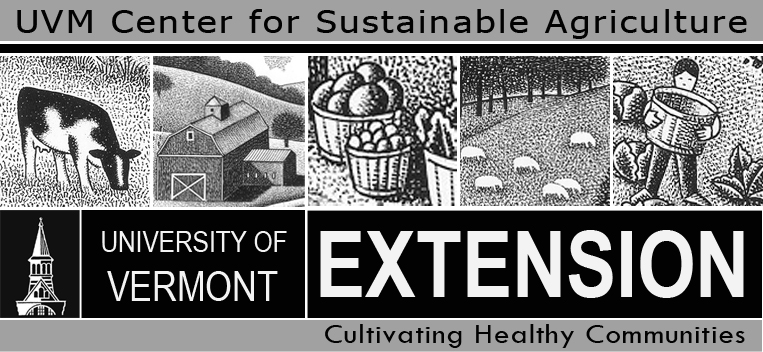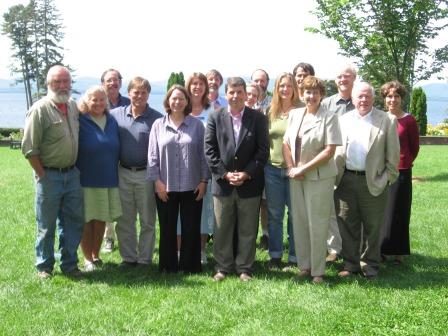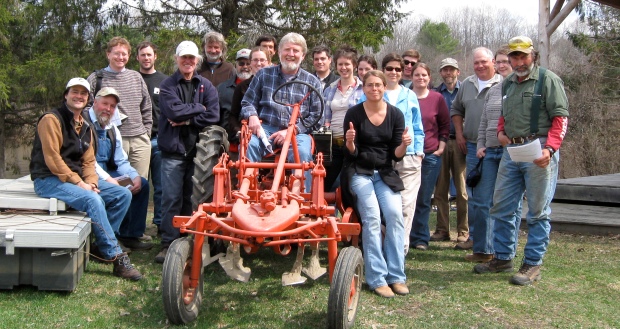University of Vermont: Center for Sustainable Agriculture
Cultivating healthy communities
- Type:
- Sustainable Agriculture
- Categories:
- Research, Policy, and Extension/Outreach Programs
- Keywords:
- General info
-
What is the UVM Center for Sustainable Agriculture?
The Center was founded in 1994 to conduct research and outreach to help Vermont move forward as a leader in sustainable agricultural practices. Since that time, we have engaged in countless outreach and applied research projects, helped launch new programs within UVM and the state at large, and developed a transdisciplinary, systems-based approach to addressing needs in Vermont's vibrant food system. We continue to research leading-edge practices and new approaches that help farmers and other food system stakeholders who are seeking profitability, incorporating environmentally regenerative practices, and addressing social and community-based food-related needs. We are a proud part of UVM Extension, and work in close collaboration with other Extension programs as well as many other colleagues on-campus and in the broader community.
What Does the Center Mean by "Sustainability?"
Many people talk about the three legs of sustainability as a way of describing the interconnectedness and necessary balance between the economic, environmental and social components of a viable food system. Recently, colleagues have added a fourth element, education, to describe the need for knowledge to be shared today, and passed down to future generations. Because our work has shown us the value of these approaches, we work towards practices that:
- Address economic needs. Economic sustainability means that farmers are able to be fairly compensated for their work.
- Assure care for the environment. For example, environmentally sustainable practices tend to build healthy soil, promote water quality, reduce energy use, and/or promote health and biodiversity among plants and wildlife.
- Provide for recreational, social, intellectual or spiritual needs of those engaged in food systems work, support community needs and connections, and/or address social justice issues.
- Ensure that information and knowledge are shared broadly with all with an interest in improving our food system
What about Organic?
We are glad to work with any farmers who are seeking to increase the sustainability of their operations, whether they are following conventional or organic agricultural practices, or other approaches.
We observe that farmers who seek to incorporate the practices that build soil health, improve water quality, and build over-all resiliency frequently have operations that move along the continuum towards organic. We also know that an operation doesn't need to be certified organic to follow practices that build soil health and improve water quality.
We see the merit in organic certification, whether at the local VOF or federal USDA level, and also understand that different approaches make sense for different farmers and operations.
Because the perceived cost of certification is sometimes stated as a barrier, we do want to make sure that folks know that 75% of the cost of certification is refundable through the USDA Cost Share Program that was reauthorized under the recently-passed Farm Bill. Contact Dennis Parker at VAAFM at
This email address is being protected from spambots. You need JavaScript enabled to view it. or 802-828-0038 for more information on the program.Who Does the Center Serve?
We are here to serve the people of Vermont and the region through our work across areas of the food system, from on-farm production through the realms of marketing, distribution, food justice and access, nutrition, and more.
We currently have staff and funding to work with:
- Farmers raising livestock on pasture, or seeking to transition to grass-based farming.
- Farmers seeking land.
- Land-owners seeking farmers to lease their land.
- New farmers seeking assistance to expand their enterprises on their farm.
- Stakeholders interested in reducing food waste, at both the household and community levels.
- New American farmers who are involved with New Farms for New Americans program.
- Aspiring farmers 14-21 years old through the Youth Agricultural Individual Development Account Program.
- Farmers who are interested in learning about practices to help them manage potential impacts of climate change.
- Farmers seeking to address run-off and drainage issues .
- Potential collaborators and research partners within UVM Extension, in other departments and colleges within UVM, in the region, around the country and around the world.




University of Vermont: Center for Sustainable Agriculture
Cultivating healthy communities